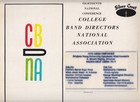
A CELEBRATION OF FLAMENCO MUSIC, COMPOSED BY CARLOS SURINACH, A SPANISH BORN COMPOSER - CONDUCTOR, IN 1954. SURINACH EMIGRATED TO THE U.S., BECAME A DANCE COMPOSER AND BECAME A CITIZEN IN 1959. PERFORMED BY THE BRIGHAM YOUNG UNIVERSITY WIND ENSEMBLE.
highschool bands
jazz bands
college bands
all region bands
community bands
concert bands
honor bands
interlochen arts academy
marching bands
national music camp
tmea all state bands
university bands
Story behind the song
Carlos Surinach (born-Barcelona, Spain, March 4, 1915 - died-New Haven, Connecticut, United States, November 12, 1997) was a Catalan Spanish-born composer and conductor.
Surinach's third symphony (Sinfonietta Flamenca) is a modest affair, at least in size; in temperament, it's a bold celebration of flamenco music. Considering this, the composer's commentary on the work is surprisingly terse and general: "The south of Spain has always been the source of the greatest wealth of native music. This wealth concentrates most in the flamenco style with its terrifying intensity and deep meditation. But Spanish composers have not delved into it very much, their refinements making no concession to Spanish flamenco flamboyance where it interfered with academic rules. This Sinfonietta Flamenca should have a maximum of flamenco style and a minimum of conventionalism."
The highly rhythmic first movement, Vivo grazioso, opens with a blast of brass and thundering timpani, identifying the folk source straight off. The music is heavy though fast and forceful, and adheres to sonata-allegro form. The second movement, Andantino, begins more delicately, with woodwinds playing over an ostinato harp figure, but the full orchestra soon breaks in with a more aggressive treatment of the same subject. After an interlude of new, more restrained material, the opening passage returns, this time without noisy intrusion. That comes with the brief but belligerent third movement, Allegro ma non troppo, which returns the flamenco style to the fore. The concluding Presto agitato is even more strongly accented and faster (full of the "terrifying intensity" the composer describes above), culminating in a heel-stomping whirl.
Carlos Surinach was among this century's premier composers for the dance. His works combined the fiery imagery of his native Spain with the technical sophistication of his German musical education. Studies in composition at the Barcelona Conservatory were followed by advanced work at the Dasseldorf Conservatory, the Cologne Hochschule, and Berlin's Prussian Academy as well as at lecture-seminars under Strauss. He was conductor of the Barcelona Philharmonic and the orchestra of the Gran Teatro del Liceo before moving to the United States in 1951 where he gained renown as both composer and conductor.
In the United States, Surinach's scores were quickly picked up by choreographers and dance companies including Martha Graham and the Joffrey Ballet. Graham included his Acrobats of God and Embattled Garden in her Edinburgh Festival programs and the Joffrey programmed his Feast of Ashes for their Russian tour in 1963. An impressive body of orchestral, choral, and chamber music as well as music for the dance is uniquely colored by Surinach's innate sense of rhythm and melody.
The BMI Foundation sponsors The Carlos Surinach Awards and Commissioning Programs, which recognizes talented emerging young musicians for their service to American music and funds the creation of new works by former winners of the BMI Student Composer Awards. The program was established by a bequest from Surinach.